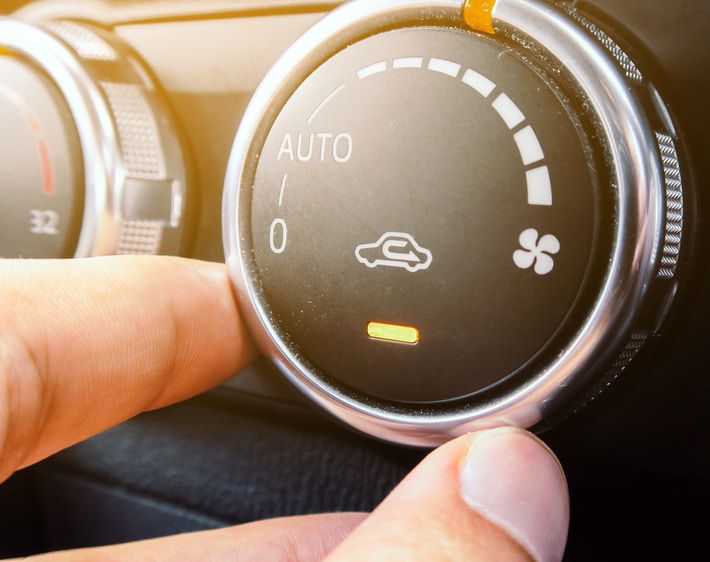Can’t handle the heat from your malfunctioning car A/C? If you’ve noticed your vehicle's air conditioning is losing its cool, a leak might be to blame. However, unlike motor oil leaks, car A/C leaks aren’t always easy to spot. Look out for these symptoms that might clue you into a car air conditioning leak.
What is a car A/C leak?
Your car’s A/C is a system that cools the air and regulates humidity inside the cabin. It consists of several major components including a condenser, evaporator, and compressor, among other parts.
To keep your cabin cool and conditioned, a colorless (and relatively odorless) refrigerant circulates through the A/C system. As refrigerant travels through your A/C system, it cycles through liquid and gas states, which effectively allow it to “suck” heat out of the evaporator in the cabin, push it out of the condenser under the hood, and then fan cooler air through the evaporator and into the vehicle. Whew.
Refrigerant can leak at any point in this cycle, especially when parts of the system become loose, worn, or damaged. Since A/C refrigerant is a gas at certain stages of the cooling cycle, a tiny crack or unnoticeable hole somewhere can allow it to escape — making it extra hard for you to notice leaks until you spot symptoms of them.
How do I spot a car A/C leak?
1. Your car A/C is blowing warm air.
If you feel like your car A/C is blowing 80°F even though the temperature setting on the dash is at its lowest point, you might be losing refrigerant. However, leaks aren’t the only reasons why your car may be blowing hot air, so it’s best to get an A/C performance check to figure out the root cause of your A/C issues.
2. You hear a clicking sound when your A/C is running.
If you notice a clicking noise while your car A/C is running, your compressor might be short cycling. Some drivers compare this sound to a loud switch turning on and off continuously. In many cases, it is especially noticeable if one is standing outside of a car with the A/C running.
A short cycling car A/C compressor can be caused by a number of factors, including but not limited to low refrigerant levels resulting from a leak! As with other annoying car A/C problems, the driver's smartest option is to seek professional diagnostics over DIY solutions.
3. Your dashboard alerts you to issues.
Although not all cars have a dedicated alert light for air conditioning issues, yours might! In certain vehicle models, a car A/C malfunction like a leak may trigger the check engine light. In others, a dash light may not be triggered at all! The best way to know whether or not car A/C problems will trigger dash lights or warnings is by checking the warning light and indicator section of your owner’s manual.
Why are car A/C leaks hard to see?
Unlike motor oil and brake fluid, car A/C refrigerant is a colorless and relatively odorless substance that cycles through gas and liquid states. Because of its unique properties, A/C refrigerant rarely leaves a visible trail, streak, or odor behind when it leaks, which is why it’s hard for the untrained eye to spot.
When dealing with potential A/C leaks, the professionals at Tires Plus use advanced solutions to trace the source. In some cases, technicians use UV leak detection — adding a bit of UV dye to the car A/C system and cycling it through. When the dye circulates through the system, it escapes through any leak sites, which are then identified using a specialized flashlight.
In other cases, technicians use an electronic “sniffer” tool, which works similarly to a metal detector, except it’s designed to pick up traces of refrigerant. When the sniffer detects high concentrations of refrigerant, it alerts the technician with a series of high-pitched beeps, helping them track down the location of the leak.
Don’t sweat it!
If you’re breaking a sweat over a warm or weak car A/C, don’t! Drive to your local Tires Plus for professional diagnostics, car air conditioning repairs, or a yearly A/C Performance Check to help your car keep its cool.



